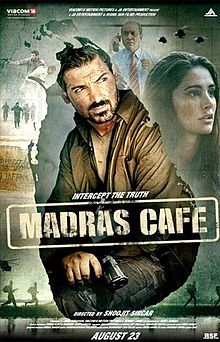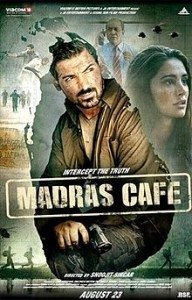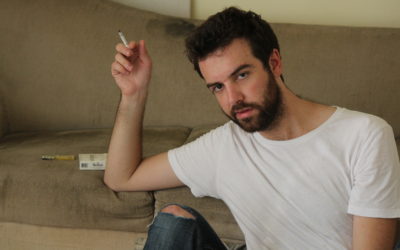Madras Cafe – 2/5
Madras Cafe is a film which treads many fine lines, struggling to maintain a balance between historical truth and fiction, fair portrayals and gross characterisations, political thriller and war action film, snappy subplots and an overarching storyline, and between quality and trash. Too often, it wobbles and comes unstuck.
From the outset, one wonders why director Shoojit Sircar even needed to label the film a work of fiction. The LTF, aka ‘Tigers’? That would be the LTTE, or Tamil Tigers. Ruthless Tigers leader Anna Bhaskaran is of course meant to be Velupillai Prabhakaran. Even the character of India’s ex-prime minister was well drawn, right down to the sneakers that Rajiv Gandhi was wearing that fateful night in Sriperumbudur. However the ‘fiction’ label all makes sense when significant factual issues arise, as one former war journalist noted here. (Simply inaccurate depictions of the Sri Lankan countryside and the Indian, as opposed to Sri Lankan dialect of Tamil are among them). The role of Sri Lanka’s government and military is almost completely left out of the picture – something they’ll probably be thankful for.
Cinematically, Madras Cafe suffers from a choppy storyline, with too many subplots in the opening stages that one isn’t sure which ones really matter. This is not helped by the fact that the pacy editing makes some of the dialogue incomprehensible, and the often intricate twists difficult to keep up with. John Abraham can’t act well – he is very good at producing movies (think Vicky Donor, for example), and he does so with integrity, but acting is not his forte. Nargis Fakhri, on the other hand, can’t act at all. I’m sure this woman is very good at modelling or whatever it is she is known for, and it’s really time she got back to doing that. Just like my most recent experience with amoebic dysentery, in this movie Fakhri first appears in Chennai and thereafter everything she touches turns to shit. At least they don’t fall in love in the end.
However Madras Cafe demonstrates something altogether more disturbing about the storywriters’ mindsets. This is a movie which plays to the songbook that India has a right to meddle in the affairs of its neighbours. This remarkably patronising notion seems to be disseminated through the Indian education system and pervades the psyche of even some of the least patriotic Indians. It fuels frustration and anger against Delhi in Pakistan, the Maldives, Bangladesh, Nepal, Bhutan and, most relevant here, in Sri Lanka. The message is made through dialogues whereby Sri Lanka is considered merely battleground, much more an extension of the Indian nation than a sovereign state of its own. Instead of questioning the morals of India’s involvement in the conflict, Madras Cafe arrogantly assumes India’s right to intervene in Sri Lanka’s civil war. We know that these questions are often relegated to the history books, but a bolder movie wouldn’t shy away from asking them – and here we wonder whether it even occurred to the film’s makers.

With scenes like this, it’s easy to see why ‘fiction’ Madras Cafe has stirred controversy in Tamil Nadu (Image: India Today)
Moreover, the film’s attitude to death and humanity is rather concerning, where John Abraham’s character Vikram notes that in war, it is always the civilians who suffer. The opening scene of a group of Tamil civilians being executed, and a series of black-and-white war photographs which taper off in frequency as the film proceeds are the only visual clues to the grim reality of Sri Lanka in the early 1990s. Once this obligatory nod is made to those who suffered as a result of the civil war, the film hardly gives them a second thought. The overarching storyline featuring a scruffy, alcoholic Vikram in a church years later begins as unnecessary, but ends ridiculously when Abraham’s character seems more concerned about the assassination of his prime minister than the murder of a loved one.
As the film ended, a couple of patrons rushed out of the cinema, presumably tired of the whole act. They completely missed the title on the screen which notes the number of human beings killed during Sri Lanka’s twenty-seven year conflict. Remind me again why this was called a work of fiction? Oh yeah, that’s right.






0 Comments